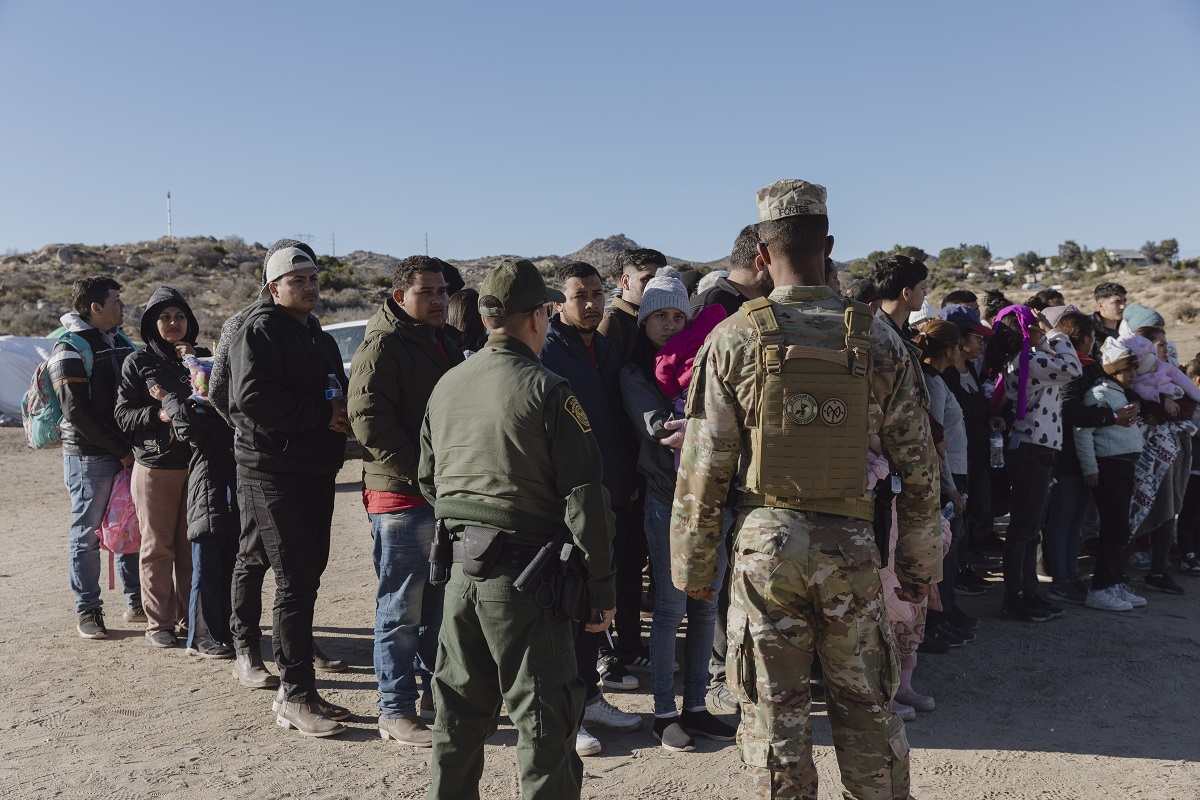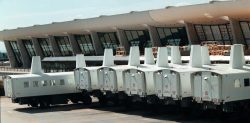
Border agents sort migrants into groups of single travelers or families in Jacumba Hot Springs, Calif., on Dec. 13.
15:56 JST, December 21, 2023
LUKEVILLE, Ariz. – Smugglers have sawed through the U.S. border wall here so many times lately that parts of the barrier look like something out of a sculpture garden or a Mad Max movie. Scraps of metal have been welded to the bars at odd angles by repair crews trying to hold the structure together. Along one badly disfigured segment spanning about 100 feet of the border, the wall has been cut 41 times.
The broader U.S. immigration system is in similar tattered shape after decades of congressional inaction and recurring migration spikes – including record numbers of illegal crossings this month. U.S. Customs and Border Protection is surpassing 10,000 encounters with migrants along the southern border per day, an influx likely to exacerbate strains on New York, Chicago and other cities already swamped by newcomers seeking shelter, food and assistance.
The latest surge is happening as negotiations in Washington to tighten U.S. enforcement have stalled until at least after the congressional holiday recess. Lawmakers are struggling to hash out a deal that would expand deportations, curb asylum claims and allow authorities to rapidly expel migrants during periods of mass crossings like the current one.
“The numbers we are seeing now are unprecedented,” Troy Miller, the acting commissioner of U.S. Customs and Border Protection, said wearily in an interview this week.
CBP this week closed vital commercial rail crossings in El Paso and Eagle Pass, Tex., after thousands of migrants traveling on freight trains to the U.S. border waded across the Rio Grande en masse. The agency has shut down a busy pedestrian crossing near San Diego, as well as the border checkpoint here in Lukeville, saying it needs CBP officers to help overwhelmed U.S. Border Patrol agents at those locations. Authorities have set up large waiting areas along the border wall and the banks of the Rio Grande that function as open-air arrival halls.
Miller said he could not recall another instance of so many border closures since the terrorist attacks of Sept. 11, 2001 – when the shutdowns were for security reasons, not to free up personnel to process migrants. Railway operator Union Pacific took the unusual step of publicly urging CBP to reopen the rail crossings, saying the routes account for 45 percent of train cargo between the United States and its top trading partner. Shipments of grain, beer, auto parts, cement and other commodities will be affected, the company warned.
The migrants are coming from a wider range of nations than ever before. Men from China, India and Turkey have been crossing into California near the town of Jacumba Hot Springs, huddling around campfires as they wait for U.S. agents to take them into custody. Families from Mexico and Central America and men from Africa are coming through the deserts south of Arizona – demographic patterns that are telltale signs of smuggler-directed operations, CBP officials say.
CBP officials say the current volume of migrants is twice the size of what the agency’s budget can support.
The preholiday surge – occurring for the second consecutive December – has added to the sense of urgency among Biden officials, who have asked for nearly $14 billion in additional immigration-related funding from Congress. The money would be used to increase border holding capacity and deportations, and to add more agents, asylum officers and immigration judges, among other provisions.
The lead negotiators, Sens. James Lankford (R-Okla.), Chris Murphy (D-Conn.) and Kyrsten Sinema (I-Ariz.), are trying to reach an agreement on several enforcement measures sought by Republicans. Democrats have balked at more stringent GOP demands, and the Republican-led House has left town for the holiday break, probably delaying any vote until January.
Broadly, a tentative deal would further restrict U.S. asylum eligibility and facilitate deportations for those who don’t qualify for protection. Negotiators are discussing a separate provision that would allow the government to rapidly expel border crossers without due process during emergency surge periods like the current one, according to officials familiar with the talks.
Republicans also want to restart border wall construction and curb the president’s ability to allow some migrants to enter the United States using an executive authority known as parole. Biden officials have drawn a line at the latter, saying they have slashed the number of Cubans, Haitians and Nicaraguans crossing illegally this year by allowing them a chance to apply for the waiver.
A close-up look at the government’s struggles to deter illegal crossings in this remote area of southern Arizona points to the limits of the measures being discussed in Washington.
The region is now the busiest place along the entire southern border for illegal crossings, despite having more miles of new barriers than anywhere else. The Trump administration spent roughly $11 billion to build 450 miles of new 30-foot fencing, much of it in public land in Arizona.
Mexico’s busy Highway 2 runs parallel to the U.S. border here, allowing smugglers to drive right up to the wall with buses, vans and trucks loaded with migrants. CBP officials say the smugglers have learned that they can reduce transportation costs by sawing through the barrier, saving them from having to drive the extra distance to Yuma, Ariz., where unfinished gaps in the structure became popular crossing points in recent years.
The sawing crews operating around Lukeville have been especially brazen. At some locations, they have hacked through the metal bars and ripped them off the wall with ropes tied to their trucks.
Miller, the acting CBP commissioner, said his agency needs Mexican authorities to do more to stop the crews, which operate in teams using angle grinders and demolition tools. Border agents are too busy processing migrants to respond when CBP detects a breaching attempt.
In addition, agents are not authorized to use force to protect the barrier. The crews generally stop sawing when Border Patrol vehicles arrive, only to resume when agents leave. CBP contractors haven’t been able to repair the damage fast enough, leading some agents to make patches and improvised braces using scrap metal.
“We need the Mexicans to step up,” Miller said.
Mexican officials say they remain committed to working with the United States to manage migration pressures.
At one unrepaired opening, opposite a migrant drop-off point agents call “Trocadero” (Truck Stop), a severed steel beam was dangling loosely from a single contact point near the top of the wall earlier this week. White lettering on the steel indicated that CBP contractors had made a repair on Dec. 5. Smugglers had returned and cut through again, right below the patch.
Groups of migrants from Senegal, Guinea, Mexico and Colombia entered illegally on a recent weekday afternoon. There were no U.S. agents nearby, so families with children hiked along the dusty border road, searching for U.S. agents to surrender to, the first step in seeking asylum.
So many people have entered through the barrier in Lukeville recently that a self-service apprehension system appeared to be in effect.
Once on the U.S. side, migrants hike along the border for miles to a designated CBP transportation hub with bottled water, latrines and military tents, where they are formally taken into U.S. custody and loaded into vans and trucks.
Jennifer Cruz, a 29-year-old from Guatemala preparing to board a van, said she and her 6-year-old son had passed through a gap in the barrier the night before, then followed the crowds to the tent station. They were on their way to Maryland, where her husband arrived six months earlier and found work as a painter. In Guatemala, “there’s so much insecurity,” Cruz said. She said she would ask for asylum.
Cruz said she paid 65,000 quetzales – about $7,000 – for her and her son’s month-long trip to the U.S. border.
More than half the migrants coming through southern Arizona are part of family groups, according to the latest CBP data. The Biden administration does not detain families, so parents arriving with children are generally released from government custody with a notice to appear in court at a future date, often months or years away.
Rep. Mark Green (R-Tenn.), the chairman of the House Homeland Security Committee, issued a statement Tuesday blaming the influx on lax enforcement by the Biden administration. “When there is no meaningful consequence applied to illegal activity, that activity will continue – and others will get the message that they can also engage in it with impunity,” Green said.
“With the advent of social media and the ability to instantly communicate with family and friends back home, this dynamic has only accelerated,” he said.
Miller, the CBP commissioner, said the supplemental funding – to pay for more agents, detention beds and deportation flights – is the key to tougher consequences. “You need the capacity to put people through the process,” he said.
Even more migrants would have been recorded as apprehended in recent days if CBP had more capacity to process them. As agents speed up the intake process, the volume of border crossers also increases, CBP officials said.
The global migration surge is being fueled by a proliferation of “travel” agencies operating in countries such as Senegal that advertise visa-free travel to the Western Hemisphere, according to CBP. The businesses connect customers to smuggling organizations that facilitate the journey to the United States.
CBP officials said they are going after the criminal networks and seeking Mexico’s help to crack down on bus line operators shuttling migrants to the U.S. border.
The proposal being negotiated in the Senate would tighten asylum rules by applying tougher standards to migrants who say they will face persecution in their home countries. The current rules grant a hearing to any who potentially face harm; the tougher standard would give access to U.S. immigration courts only to those deemed more likely than not to be persecuted.
But so many migrants are crossing in CBP’s Tucson sector that those seeking asylum don’t have to go through preliminary interviews to see if they meet the standard. They face questions only if CBP manages to transfer them to another border sector or to U.S. Immigration and Customs Enforcement, which has also maxed out its detention capacity. Otherwise they are generally released with a notice to appear in court at a future date. The government lacks the capacity to track down those who fail to show up and are ordered deported.
In recent years, CBP has built bright, climate-controlled tent facilities along the border with medical staff, showers and family-appropriate conditions, so agents can process migrants faster and get vulnerable groups, especially children, out of its custody as quickly as possible. But migrants arriving at Lukeville first need to find someone to whom they can surrender.
Ana Arevalo, a 38-year-old mother of four walking with her children and extended family along the border road the other day after slipping through a gap in the barrier, said she had previously worked at a vegetable farm in Mexico’s Jalisco state, where drug cartel violence is raging. “We can’t live there anymore,” she said. “We came for a better life.”
Arevalo stopped for a moment to scan the desert. Seeing no Border Patrol vehicles, the family continued on. “Where do we go next?” she asked.
Top Articles in News Services
-

Survey Shows False Election Info Perceived as True
-

Hong Kong Ex-Publisher Jimmy Lai’s Sentence Raises International Outcry as China Defends It
-

Japan’s Nikkei Stock Average Touches 58,000 as Yen, Jgbs Rally on Election Fallout (UPDATE 1)
-

Japan’s Nikkei Stock Average Falls as US-Iran Tensions Unsettle Investors (UPDATE 1)
-

Trump Names Former Federal Reserve Governor Warsh as the Next Fed Chair, Replacing Powell
JN ACCESS RANKING
-

Producer Behind Pop Group XG Arrested for Cocaine Possession
-

Japan PM Takaichi’s Cabinet Resigns en Masse
-

Man Infected with Measles Reportedly Dined at Restaurant in Tokyo Station
-

Israeli Ambassador to Japan Speaks about Japan’s Role in the Reconstruction of Gaza
-

Videos Plagiarized, Reposted with False Subtitles Claiming ‘Ryukyu Belongs to China’; Anti-China False Information Also Posted in Japan























